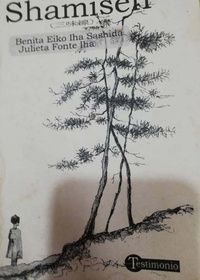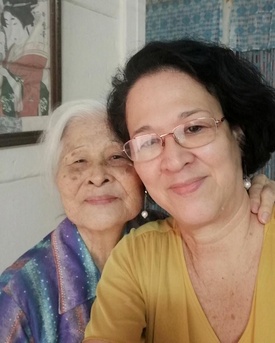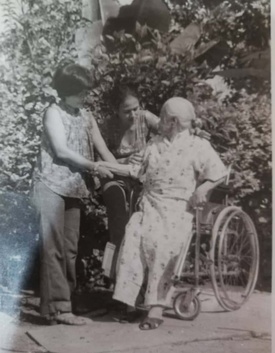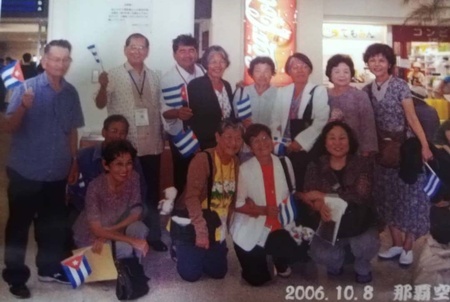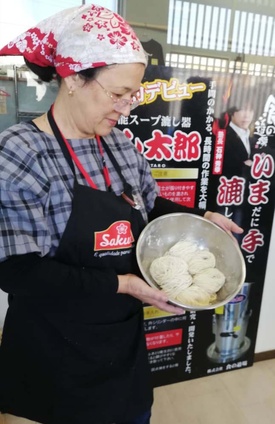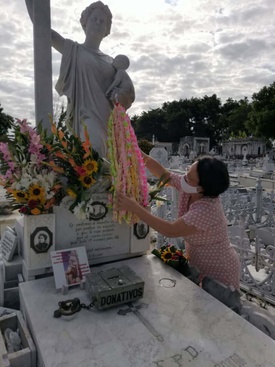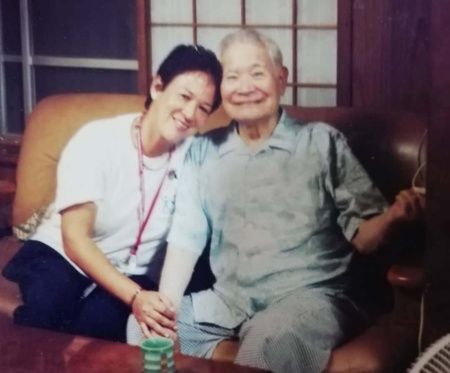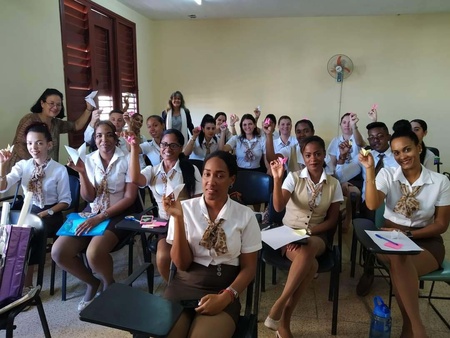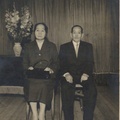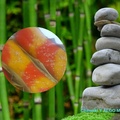Modernity shortens distances, information is just a click away, we can strengthen bonds of friendship with people from anywhere in the world through virtual means. A few years ago I received a friend request on Facebook from a certain Julio Iha, I was surprised to see that he was Cuban, ignorance makes me think that there were no Nikkeis in Cuba. The truth was that I was very wrong, immigration began in 1898, arriving from different parts of Japan.
As I saw the information that Julio shared, I was able to see a little more about the arrival of his ancestors to his country, I found chapters of a book called Shamisen , written by Benita Eiko Iha Sashida and Julieta Fonte Iha, the latter was increasingly visible for me; I found her on social networks, especially in Nikkei groups, commenting and sharing valuable information. She was Julio's cousin.
Shamisen is a book in which Benita Eiko tells some passages from the history of her family and other Okinawan families and she does so accompanied by her niece Julieta. Stories shared in the warmth of a musical family, mom singing and dad with the shamisen, accompanying with the notes that those three strings emitted, transmitting that nostalgia and often sadness, evoking the place where they were born or, perhaps, the greatest sadness, that of having left their loved ones. Leaving your children, even when they are left in the care of your grandparents, is very painful, but it was impossible to bring several children on a risky and uncertain adventure, where they were only encouraged by the idea of returning after having met their financial goal. Most of them could not return and carried that suffering until their last days.
Perhaps the choice of Cuba was because they came from a place where the main activity was agriculture, a place with fertile lands or perhaps because of the climate so similar to that of Okinawa, where fruits and sugar cane were grown. I say that they tell the story of the Iha family, the real thing is that they represent the experience of all those Japanese immigrant families in search of a dream, of a better future in a distant place.
In Cuba, following the Second World War, according to the prevailing policy, all male Japanese, Italian and German citizens were imprisoned. The amazing thing was that the Japanese were the majority, but it was not that there were more of this nationality, it was because they were the poorest and the Europeans had escaped prison due to the economic power they had, they were even the ones who were deprived of their freedom the longest. , being detained months after Japan's capitulation.
It was a dark time for Japanese families, when women had to be fathers and mothers, supporting their families alone, in a very critical period economically, especially due to the devastating hurricane of 1944 that affected all Cubans, and in particular to Japanese families, when the head of the family was absent. These circumstances brought to mind those scenes that were told to me about the 1940 earthquake in Peru, which occurred after the looting of the Japanese and where, according to what they say, many were kneeling, looking at the sky, asking for forgiveness for the punishment for what they had done. carried out by bandits who justified saying that they were Japanese.
It seems that kamisama (God) manifested himself that way in Cuba as well. I can't with my mind, which continues to project images like those in the book, where Benita Eiko remembers her mother, with a small figure, with an inexplicable and so much drive to raise her family. I think it is the same image of all those Japanese women in Cuban lands who played the same role. After an agonizing time, the men were back home, it was time for a new beginning, a rebirth, rebuilding, trying to heal and put together that family that had been broken, bringing them all together again.
Benita (Eiko) Iha Sashida, was born in December 1939, in the rural area of Mckinley, Isle of Pines, called the Isle of Youth since 1978, and was recognized as a cultural promoter of books and reading during the 22 years of her I work in bookstores. She is a Nisei, that is, a second-generation descendant of Japan, from Okinawa. She transmits to us the stories that her mother Kame told her, together with Julieta, in that complicity of both of being confidants of stories that had to be transmitted in the same way to the world.
Julieta Fonte Iha is Kame's granddaughter and Benita Eiko's niece. She was born in July 1960 in Isla de Pinos and, although she only claims to have the merit of having made the tea and accompanying her aunt while she wrote “Shamisen”, she was recognized as co-author of the text at Benita's request in its second edition published in 2006. She studied Psychology at the University of Havana, worked for almost ten years in special education and is currently a professor at Formatur Escuela Ramal del Turismo. Since 2005 he has lived in Havana.
Both aunt and niece served as Uchina Goodwill Ambassadors during the years 2003-2004 and 2006-2008, respectively. Together they promoted and were part of the Organizing Committee for the celebration of the Centennial of Okinawan Immigration to Cuba, held in October 2007 on the Isle of Youth.
Through Shamisen they tell the stories inherited from Kame, her teachings: How to call the wind by whistling, something magical that grandmother Kame achieved. They also narrate passages from some Okinawan families living in Cuba. The book was originally a letter explaining to the surviving son in Okinawa why his parents had not returned, as promised, in an attempt to save the memory of Kame and Kamaichi Iha. After confirming the commonality of this fact in emigrant families and being confidants of other testimonies, they arrive at “Shamisen” (or “Sanshin”, as its authors feel it should have been called), now converted into a tribute to the Okinawans established in Cuba and to Japanese emigration.
I have a beautiful virtual friendship with Julieta Fonte Iha since a little before the start of the pandemic that kept us locked up, with #YoMeQuedoEnCasa. I remember that at that time, faced with the confinement here in Peru, I didn't have much to do, so I decided to spend my time browsing social networks, in groups where I could find similar things, I got involved in the Nikkei groups that housed citizens of all over the world, in addition to local groups that were started to promote sales among members of our Nikkei community in Lima-Peru.
When looking for information about Julieta, I found it very interesting to interview her, everything I found reinforced that idea. The truth is that it was a combination of anxiety and frustration. It was my first interview, I was going to talk live, without pauses, it was not a written interview, in which they sent me the information after a questionnaire.
Here I stop to apologize to Julieta and explain the frustration I had. It was my first interview and when using a WhatsApp call, the call was not recorded, there was absolutely nothing, I had no notes, I had such a good time talking with her, like two friends.
Julieta, in addition to being co-author of the book, is a psychologist who loves her Japanese and Okinawan roots. In 2006 she had the opportunity to participate as a companion for the student Kiyomi Torres Tsuhako in the Junior Study Tour 2006, an event prior to the IV Festival Uchinanchu World Cup.
On that occasion he was able to visit museums, beaches and so many places that have great meaning for everyone who is Uchinanchu, taking with him the music, the dances, justifying and understanding the rejection of war, knowing where he comes from, his roots, so How to be sure of your identity. Verifying that Okinawa is a magical place, where she did not feel foreign, living with her peers from other countries, family and friends as if she had known each other all her life, discovering that that sata andagi she ate in Okinawa had the same flavor as the one from the grandmother. Understanding that that phrase “Ichariba Choode”, once we meet, we become brothers, was what summed up everything he felt.
She is also a former JICA Yokohama Program 2018 scholarship recipient. She studied at the JICA International Cooperation Center in Yokohama, alongside Nikkeis from Argentina, Bolivia and Brazil, taking the course on Reactivation of Ladies' Associations of Nikkei Collectives through the food. He was able to acquire knowledge of gastronomic techniques through workshops to solve the difficulties faced by the different Nikkei communities. He was able to learn more about the history of Japan and its migration, such as the role of Nikkei organizations today.
Last year was difficult for our family, there was a medical problem for my daughter, there was a lot of uncertainty, it was a difficult time for all the people who had to go to a medical center at the height of the coronavirus. In my desperation, I made it public, and I was very sorry to say it, I shouldn't have aired my personal life, but seeing people's response, it gave me great satisfaction to find prayers and good wishes from many people I don't know.
One of these people was Julieta, this Nikkei Cuban kept in touch with me with words of encouragement, telling me that a neighbor of hers had had the same thing as my daughter and that it had turned out well, in addition to her prayers. We had strengthened our friendship despite so much distance, so after a while he shared with me his concern about the pregnancy of his only daughter who does not live in Cuba, fears that were discarded after the pertinent tests were carried out.
However, she made a promise: to make a thousand cranes wishing for a good pregnancy and health, so that they would be blessed. What things are, she told me with great joy on October 30, 2021, World Uchinanchu Day, that she had received the news of the birth of her granddaughter, daughter of Narryman, on a day so significant for people like her. , who loves her Uchinanchu roots, and who received a great gift, as she herself said.
Julieta Fonte Iha is a very admirable Cuban Nikkei woman. When I interviewed her on the phone, I felt warmth and joy in her voice, someone who treated me with a lot of respect, but at the same time I felt as if we were friends for a long time, that there was trust between us. us, feel his passion when recounting both experiences in the country of his grandparents.
At that moment I imagined that his eyes were shining. I perceive that she is a fighter, educated to get ahead, as her grandmother Kame, her mother Maria Mitsue and her aunt Benita Eiko transmitted it to her, full of values, of examples that she has followed, searching for her own identity, going in search of her roots. to know where you come from and to decide where you want to go.
The two trips to Japan have helped her to return recharged with the energy typical of the country of her ancestors, with that philosophy of life, transmitting that acquired knowledge: teaching customs and values, in addition to collaborating to strengthen Nikkei associations in her country, sharing their experience so that more people can apply for these scholarships or aid that can contribute to the development of their country.
I quote the Argentine Nikkei, Professor Juan Alberto Matsumoto 1 , in an article for Discover Nikkei:
“[…] As for the Nikkei of Cuba, the hope is that in this gradual opening they will be able to relate more with their peers from neighboring countries, South America and Japan. It is very possible that assistance and training programs will increase and they will have more possibilities to study in Japan. “It will be a new challenge to contribute better and much more to your own country.”
Finally, I am left with a phrase that Julieta shared on her Facebook and that for me summarizes everything in it:
"Being educated is the only way to be free".
I apologize, Julieta, for not having told you that the interview had not been recorded, you will only find out by reading the article, this is a recognition of a valuable woman and I can only tell you: “Ichariba Choode”.
Note:
1. He is a specialist and teacher of Japanese Immigration History at the Kaigai Nikkeijin Kyokai for JICA Nikkei Scholars.
© 2022 Roberto Oshiro Teruya


